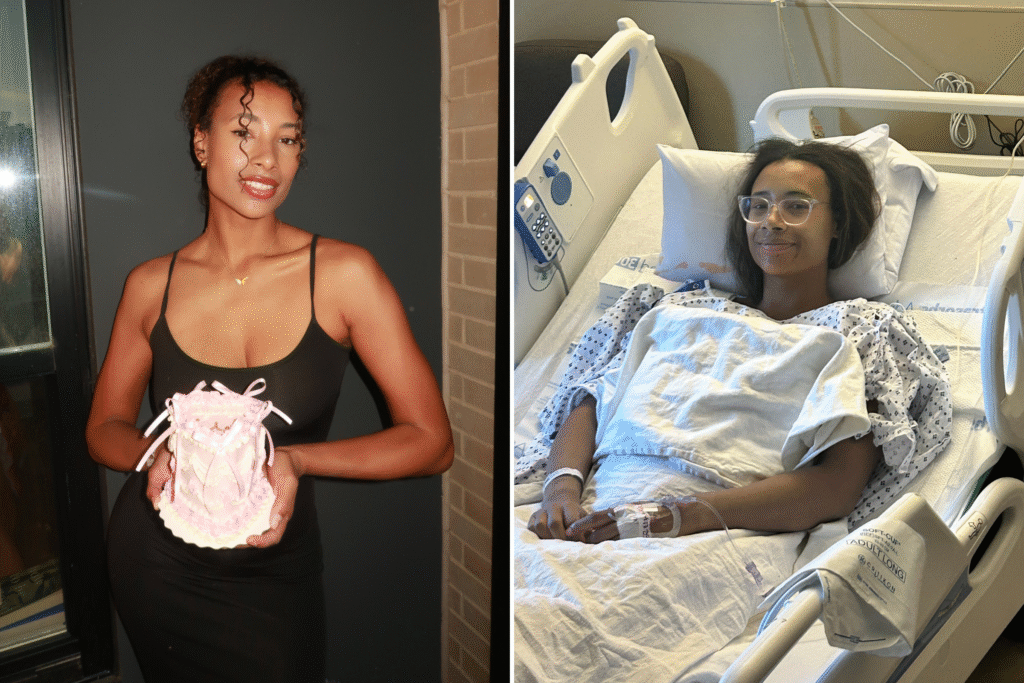“I never imagined I would be facing cancer in my early thirties. I will never forget the moment I heard the words ‘unfortunately, we did find cancerous cells’.”
Starting in 2023, when she was just 29, Claire Meitinger began to notice some unusual symptoms. It started with a lump in her right breast which was examined but an ultrasound showed nothing. She was told it was just dense breast tissue.
She was in her late twenties, and had no family history of breast cancer, so Meitinger, of Richmond, Virginia, was told it was nothing to worry about. However, in the months that followed, she told Newsweek that the lump became “very painful” and her concerns only mounted.
“Leading up to my 30th birthday, the pain only got worse, and at the end of the year I went back for another breast exam and finally got my referral for a mammogram,” Meitinger, 31, said. “However, once again, the imaging showed nothing but extremely dense breast tissue. I was told to take vitamin E supplements for the pain.”
By 2024, she also noticed that her right breast was noticeably larger than the left. But again, she was told that everything looked normal on the scans.
It was getting harder to explain all the peculiar symptoms, and she knew deep down that something was going on. In December 2024, Meitinger noticed a dark spot on her breast, and for her, it felt like “confirmation that something was really wrong.” That marked a pivotal moment and she returned to the doctors to seek answers.
“I had the feeling that the provider I saw that day had already labeled me as a hypochondriac (or did not take my concern seriously) because I had come in for the same concern several times. She told me it looked like eczema, and suggested I use a topical steroid cream on the dark spot and come back if it did not improve within 2 weeks,” Meitinger continued.
Part of Meitinger expected to be dismissed (because she had been so many times already,) but she knew it wasn’t eczema. Having had eczema since she was a child, she knew what it looked like on her skin—and it certainly wasn’t this dark patch.
The patch wasn’t itchy, flaky, dry or in an area where Meitinger gets flare-ups. If anything, she thought it looked more like a bruise. She refused to accept eczema as the diagnosis, and she pushed the doctor for another mammogram.
Meitinger said: “Just because imaging did not pick up on anything a year ago, did not mean there was nothing wrong. The pain, swelling, and this dark spot had to mean something. Even if it wasn’t cancer, it wasn’t normal and I deserved answers.”
A mammogram in January 2025 revealed widespread calcification in Meitinger’s breast, a possible indication of early-stage breast cancer. As a result, she also had a biopsy which confirmed the presence of cancerous cells.
At the time, she was diagnosed with Ductal Carcinoma in Situ (DCIS), however that was subsequently changed to stage 1 Triple Positive Invasive Ductal Carcinoma (IDC).
What is Invasive Ductal Carcinoma?
According to The Cleveland Clinic, IDC accounts for around 80 percent of all breast cancer diagnoses in women. It starts in the cells that line the milk ducts and can spread to surrounding breast tissue. From there, it can also get into the bloodstream or lymphatic system.
Symptoms of IDC include a change in size, shape or contour of the breast, a mass or lump, changes in the look or feel of the skin or thickening in or near the breast or underarm.
Meitinger underwent a bilateral mastectomy to remove all breast tissue in April 2025. She also had reconstruction surgery using temporary implants, with the aim of eventually getting permanent implants. In addition, she had several lymph nodes removed from her armpit which later tested negative for cancer.
Becoming a Cancer Advocate
Her cancer journey is far from over, as the 31-year-old is undergoing 12 rounds of chemotherapy and a year of immunotherapy. She must also take hormone blockers for at least five years to decrease the risk of recurrence.
Thankfully, her symptoms from chemotherapy have been manageable, and Meitinger remains confident that she will have a “a long and healthy future.”
Following her diagnosis, she has been documenting her experiences on social media (@clairemeit on TikTok and Instagram) to raise awareness and connect with others. Many of her videos have gone viral with hundreds of thousands of views. She often posts about her early symptoms, the eczema diagnosis and how she’s navigating chemotherapy.
“I did not have anyone in my life who had experienced it, let alone someone my age,” Meitinger said.
“I immediately turned to social media to see if I could find anyone else going through a similar experience and found a wonderful community online. I wanted to contribute and be a resource for others who are scared and don’t know what to expect.”
Now, she urges other people to be their own advocate when they feel concerned. Meitinger was dismissed on several occasions,and she doesn’t want others to have to go through the same experience.
Her biggest advice for other is to trust their instincts and ask questions about anything that doesn’t seem right. If it gets dismissed, seek a second opinion. Meitinger knew something was wrong and was led to believe it was perfectly fine or just eczema before finally being taken seriously.
She continued: “Patients want to be able to trust our healthcare providers and know they did everything to address our concerns. It should not be acceptable to send a patient home telling them their pain is normal or, in my case, ‘just what we have to go through as women’.
“We deserve to be listened to, believed, and given answers. At the end of the day, we know our bodies best, and we deserve to understand what is causing our symptoms,” Meitinger said.
Is there a health issue that’s worrying you? Let us know via [email protected]. We can ask experts for advice, and your story could be featured on Newsweek.
Read the full article here

















